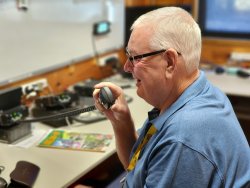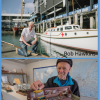Emergency radio volunteers heard, but rarely seen

A small and unassuming weatherboard building on the North Shore hides a big secret – a little-known group of committed volunteers who could help Auckland get through a disaster.
They’re the North Shore Radio Club and the Auckland branch of AREC – Amateur Radio Emergency Communications NZ. They’ve played pivotal roles in natural disasters, and civil defence emergencies. This year alone they stepped up during the Auckland Anniversary Weekend floods, and during the havoc of Cyclone Gabrielle just a few weeks after that, to name just two. More on that later.
They also provide radio support to the NZ Police, LandSAR (Search & Rescue), the Rescue Coordination Centre, CoastGuard, and Surf Livesaving, and also provides radio comms support to a range of community events.
Despite all that they do – on 24/7 call for emergencies, and their day-to-day operations – this is probably the first time you’ve ever heard of them. They’re as unassuming as the building they operate from. They’re the unseen, unsung heroes – quietly doing their thing behind the scenes; not wanting or seeking the limelight – just the knowledge of a job well done.
Now, as Cyclone Lola batters Vanuatu – and the tail of the cyclone lashes the upper North Island – we’re reminded again just how quickly emergencies can strike, and how important it is to be as ready as we can.
When the power is out in an emergency, landlines and the internet won’t work. Power outages can also affect celltowers, causing mobile blackouts. And it doesn’t take too long for mobile phones to run flat.
Radio might be the only means of communicating, and co-ordinating a response.
And so, every Wednesday morning, AREC volunteers gather in a small room in that small, nondescript building at 400 East Coast Rd. It was once North Shore City’s thriving Civil Defence base, but is now a quiet backwater used as a work base by roving council staff – and is home to the radio volunteers.
I met up with members Andy Brill, Graham Barton, Allan Campkin, Maurie Ogden, and John Baxendale there. There are many more volunteers like them - but they simply wouldn't all fit in the tiny room they work from.
Each week, they do radio callouts to a long list of organisations who are part of their emergency radio network – ensuring every group is experienced in using the equipment in the event of an emergency, and that all the equipment (including the repeaters) is in good working order.
The first batches of their weekly callouts are in geographical groupings – starting in Rodney with places including Scott’s Landing, Warkworth, Whangateau, Maungaturoto, and down to Whangaparaoa.
The callouts are brief and to the point – and it’s impressed on me several times during the morning that this is a crucial element of radio communications. They’re for essential information, not chit chat.
‘Maungaturoto, this is North Shore Comms Base,’ says John Baxendale, who’s busy doing the first batch of calls.
‘Maungaturoto. You’re loud and clear, over,’ comes the swift reply.
‘Good morning Maungaturoto, we’ve received you loud and clear,’ John says. ‘We’ve got a request for you. Could you go to ESB133, which is the Glorit repeater. Over.’
‘Received, I’ll switch to that now.’
The repeater is checked, and is working fine. It’s an important part of the weekly callouts, ensuring the signals are working and alerting authorities to any that need fixing, keeping the whole network robust.
Allan Campkin does another batch of calls. He talks to the council’s Great Barrier Service Centre, United Water, the Waiheke CDEM (Civil Defence Emergency Management) base, Watercare Central, and Watercare Rosedale. He also checks in with Auckland Emergency Management’s Emergency Control Centre – now the nerve-centre of the city’s Civil Defence operations – the NZ Police NorthComm base, and the Whenuapai Defence Base.
More batches of calls continue to different parts of Auckland, including a number of schools – mostly in rural areas of Rodney and Franklin. There’s also a small, but growing, number of volunteer community emergency and civil defence groups doing their bit to be emergency-ready.
AREC’s support doesn’t end with weekly callouts, or the round-the-clock support they may need to provide in emergencies. Over the years they’ve helped many groups to get set up with the right equipment, and provided training. They’ve also been busy meeting with newly-formed community emergency response groups to advise them and, once they’re set up, adding them to their roster of weekly callouts.
Their experience and knowledge is impressive.
The Anniversary Weekend Floods caught everyone unawares – including MetService and Auckland Emergency Management. ‘We didn’t get any alerts from AEM in advance – not a peep,’ says Andy Brill, a former policeman who’s not only a passionate radio enthusiast, but well versed in handling emergency situations
However, they were soon called out by the Police to help in the search for a missing man in Onewhero, in the northern Waikato.
‘We helped, along with Search & Rescue. We were down there for two days with that, based at the Onewhero Fire Station,’ Andy says. ‘We do quite a lot of work with Search and Rescue, and get most of our funding from them. We don’t get any funding from Civil Defence.’
When Cyclone Gabrielle was heading in New Zealand’s direction a few weeks later, the authorities were better prepared.
‘We started setting up here on Wednesday 8 February, when AEM said we might be needed,’ says Andy. ‘We had a meeting with AEM on Thursday 9 February, and started really getting into the nitty gritty. On Friday and Saturday we got set up and did our planning, and started implementing it on the Sunday.’
‘We set up the radio room,’ continues Allan Campkin, ‘and also took over a couple of meeting rooms. We set up a communications radio, which needs a cable to run out to a rooftop aerial – and set up a computer for logging calls.’
When Cyclone Gabrielle hit on Sunday night, they were ready, says Andy.
‘On the Monday we were in full swing, and the cyclone hit its peak on Monday night. Strangely, AEM stood us down at 6pm on Monday, as they didn’t think we’d be needed – then called us back at 6.30pm. We had someone covering the 7pm-midnight shift, then I did the midnight to 8am shift, and the dayshift took over at 8am.’
If their base is damaged, or they aren’t able to get there, they can still operate.
‘We’ve all got self-contained home radio stations – with radios, transmitters, aerials, computers, and backup power supply’ says Maurie Ogden. ‘And in our cars we’re set up to be fully mobile, too.’
During the course of the cyclone 18 people manned the AREC base, coming and going in shifts.
‘Our primary role was providing comms to civil defence centres, and communicating with NZ Response Teams, who help with fallen trees, roofs coming off, etc.
‘We also co-ordinated with Community Response Groups (GRGs). A lot of our groups are in the more rural areas around Rodney and Franklin,’ he says. ‘Over a number of years, AEM had stepped back from CRGs, they just weren’t aware of a lot of them. And the CRGs didn’t know how to reach AEM either.’
After widespread power outages around Rodney, radio comms were crucial – providing practical information such as road closures.
‘On Monday night there was the terrible slip at Muriwai, where two volunteer firemen were killed. On Tuesday morning we were advised that the repeater cover in Muriwai didn’t seem to be working,’ Andy continues. Mobile phone coverage was out, too.
‘One of the things I’d done here on the Sunday had been to set up two portable repeaters and get them charged. They’re in a suitcase-like box. We have two here.’
So off they went to Muriwai with their portable repeater to ensure emergency services had radio cover. The mobile network was restored not long after they arrived – but the event highlighted how difficult communications can be in an emergency.
AEM also needed their help in Warkworth, where they’d set up a Civil Defence Centre where people could evacuate if necessary, and get general support. They only had a hand-held radio which did not work – so AREC supplied a better radio to meet their needs.
Our conversation moves on to an animated discussion of the the pros and cons of satellite phones, particularly the growing popularity of Starlink – and of mobile phones, shortwave radio, CB radio, and more. I confess I got lost in a whirl of technical details of how they work, the distance they can cover, the advantages and disadvantages of different systems.
I’m involved with a couple of community-led civil defence groups – and am relieved when they tell me I won’t need to learn all of this today, as AREC will happily guide us on what we need, teach us how to use it, and add us to their roster of weekly calls.
Auckland’s much-criticised response to the Anniversary Weekend Flooding was the subject of an independent review. It was clear that Auckland simply wasn't prepared to deal with an emergency that was so widespread, and with so many significant problems across a huge geographical area. In response to the lessons learned from the back-to-back flood and cyclone emergencies, Auckland Emergency Management are now also making a number of changes to be better able to respond to future emergencies – which can happen anytime, anywhere, sometimes without warning.
One of the changes is increasing the number of staff dedicated to supporting community response groups. They’ll help communities to prepare localised emergency plans that are specific to their area, and form volunteer groups who can be the knowledgeable and well-prepared backbone of an immediate response – so they can manage ‘until the cavalry arrive’.
It’s not something that will happen overnight – but it’s a positive step in the right direction, towards every community being disaster-ready.
And if disaster should strike, the unassuming band of radio brothers will be there behind the scenes, in their unassuming little base, or out in the field, helping with the communications which form a crucial part of responding quickly and effectively.
AREC – we salute you!
By Ruth Jackson
Volunteering Auckland Media & Marketing
ABOUT AREC NZ
You can find out more about AREC NZ here: https://www.arec.nz
ARE YOU DISASTER-READY?
The AEM and government’s Get Ready websites both have great information on how you can be disaster ready at home, at work, and as a community.
https://www.aucklandemergencymanagement.org.nz/
https://getready.govt.nz/en/

